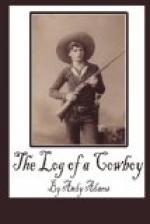On finishing his little yarn, Stallings arose, saying, “I must take a listen to my men on herd. It always frets me for fear my men will ride too near the cattle.”
A minute later he called us, and when several of us walked out to where he was listening, we recognized Roundtree’s voice, singing:—
“Little black
bull came down the hillside,
Down the hillside, down
the hillside,
Little black bull came
down the hillside,
Long time ago.”
“Whenever my men sing that song on guard, it tells me that everything is amply serene,” remarked our segundo, with the air of a field-marshal, as we walked back to the fire.
The evening had passed so rapidly it was now almost time for the second guard to be called, and when the lateness of the hour was announced, we skurried to our blankets like rabbits to their warrens. The second guard usually got an hour or two of sleep before being called, but in the absence of our regular foreman, the mice would play. When our guard was called at one o’clock, as usual, Officer delayed us several minutes looking for his spurs, and I took the chance to ask The Rebel why it was that he never wore spurs.
“It’s because I’m superstitious, son,” he answered. “I own a fine pair of silver-plated spurs that have a history, and if you’re ever at Lovell’s ranch I’ll show them to you. They were given to me by a mortally wounded Federal officer the day the battle of Lookout Mountain was fought. I was an orderly, carrying dispatches, and in passing through a wood from which the Union army had been recently driven, this officer was sitting at the root of a tree, fatally wounded. He motioned me to him, and when I dismounted, he said, ‘Johnny Reb, please give a dying man a drink.’ I gave him my canteen, and after drinking from it he continued, ’I want you to have my spurs. Take them off. Listen to their history: as you have taken them off me to-day, so I took them off a Mexican general the day the American army entered the capital of Mexico.’”




